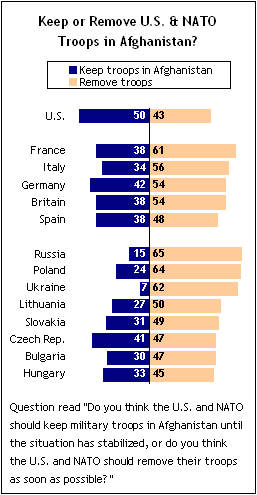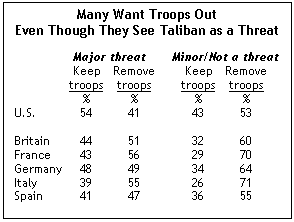by Richard Wike, Associate Director, Juliana Menasce Horowitz, Senior Researcher, Pew Global Attitudes Project
 A transatlantic consensus exists with regard to the threat posed by extremists in Afghanistan and Pakistan, even though Americans and Western Europeans generally disagree about what policy to pursue in Afghanistan.
A transatlantic consensus exists with regard to the threat posed by extremists in Afghanistan and Pakistan, even though Americans and Western Europeans generally disagree about what policy to pursue in Afghanistan.
A 14-nation survey by the Pew Research Center’s Global Attitudes Project, conducted Aug. 27 through Sept. 24, finds Americans expressing the greatest concerns about the Taliban regaining control of Afghanistan: roughly three-in-four (76%) say that this would be a major threat to the well-being of the U.S.1
However, solid majorities throughout Western Europe also see this as a major threat to their nations, including 72% of Italians and at least six-in-ten in France (66%), Germany (65%), Spain (64%) and Britain (60%).
Concern is also shared about the potential danger from a Pakistan controlled by extremists. More than six-in-ten Italian (68%), French (67%), British (65%) and American (64%) respondents say this would be a major threat to their countries. Slightly smaller majorities hold this view in Spain (59%) and Germany (57%).
Eastern Europeans are generally less concerned than those in the West about these potential dangers.
Fewer than half in the eight Eastern European countries surveyed believe extremist takeovers of Afghanistan or Pakistan would present a major threat. Within the region, Poles, Bulgarians and Czechs express the greatest concerns — more than four-in-ten in these countries say extremist control of Afghanistan or Pakistan would pose a major threat.
There is less concern among Lithuanians, Slovaks and Hungarians, as well as in the two nations surveyed that are not NATO members: Russia and Ukraine.
The War in Afghanistan
 While both Americans and Western Europeans generally believe the “Af-Pak” region potentially poses significant threats to national security, they do not share a common view about the deployment of military forces in Afghanistan.
While both Americans and Western Europeans generally believe the “Af-Pak” region potentially poses significant threats to national security, they do not share a common view about the deployment of military forces in Afghanistan.
Half of Americans say U.S. and NATO troops should remain in Afghanistan until the situation has stabilized, while 43% want them removed as soon as possible. By contrast, majorities in France (61%), Italy (56%), Germany (54%) and Britain (54%) say troops should be withdrawn, as do roughly half in Spain (48%).
Throughout Eastern Europe, majorities or pluralities want U.S. and NATO forces out of Afghanistan, including 64% of Poles, as well as 65% in Russia and 62% in Ukraine.
More people in several nations now favor withdrawal than was the case in the spring. This is especially true in France, where a Pew Global Attitudes poll conducted in May and June found that 49% favored removing troops, compared with 61% today. Smaller increases have taken place in Poland (+7 percentage points), Germany (+7), Britain (+6) and the U.S. (+5).
 Unsurprisingly, people who believe a Taliban takeover of Afghanistan would be a serious national security threat are more likely to endorse keeping troops there.
Unsurprisingly, people who believe a Taliban takeover of Afghanistan would be a serious national security threat are more likely to endorse keeping troops there.
However, even among Western Europeans who consider this a major threat, opinion leans toward a troop withdrawal. In all Western European nations surveyed, majorities or pluralities of those who say a Taliban takeover would be a major threat nonetheless want troops removed. Conversely, among Americans who see this as a major threat, 54% want to keep forces in Afghanistan, while 41% favor a withdrawal.
For more information see the topline results.


